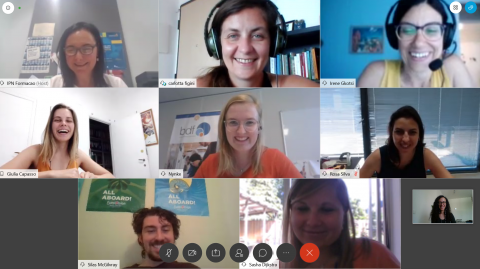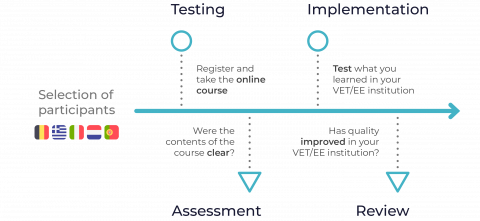4.6 - External Evaluation
Abstract
Feedback is often collected from students and from teachers and trainers, but, as a Quality
Manager, you should not underestimate the importance of having external feedback on the
activities and on the results of the training.
Why is this important for you as a QM?
- To improve the quality of the evaluation, which is one of the key parts of the quality management process
- To understand the strong and weak points of the whole system
- To gather insights on how to improve the training
- To have a more objective point of view
- To improve the involvement of key stakeholders, whose engagement is vital to your organisation
How should I implement the action?
- Identify the external stakeholders to involve in the evaluation process: i.e. former graduates and their employers, companies cooperating in work-based training, business organisations (such as chambers of commerce and industry) and other stakeholders in the local community
- Gather feedback from employers of former graduates on the quality and results of the training, mainly through surveys and interviews
- Ask the external evaluator to include an objective assessment of the learning outcomes achieved;
- Collect observations and feedback by an external evaluator during site visits of the VET institution’s teachers and trainers
- Discuss evaluation results with the external evaluator and the responsible teachers and trainers in the VET institution
- Organise workshops or focus groups, encompassing all stakeholders
- Develop shared quality indicators with companies or other stakeholders with which the VET Provider cooperate
- Agree with the external stakeholders on a common quality approach
How should I know if I have made impact thus increasing the quality of the VET provision and to which extent? (Indicators also linked with the EQAVET if any):
- the amount of feedback received from external subjects is enough
- the amount of courses that were improved by an external evaluation is high
- the feedback provided by the external evaluator has allowed you to improve the quality of
- the course, and this may bring
- an improved participation rate in the courses, as measured by the EQAVET indicator n.3
- an improved completion rate in the programme, as measured by the EQAVET indicator n.4
Links & further readings (includes also third-party resources- videos, etc.):
- Cedefop 2015, Handbook for VET providers [https://www.cedefop.europa.eu/files/3068_en.pdf]. Last accessed 30/03/2020
- European Training Foundation, 2015, PROMOTING QUALITY ASSURANCE IN VOCATIONAL EDUCATION AND TRAINING [https://www.etf.europa.eu/sites/default/files/m/B77049AC22B5B2E9C125820B006AF647_Promoting%20QA%20in%20VET.pdf] (Last accessed 30/03/2020)
Glossary
Unit 4
Time - Preparatory phase:
Low:
1 hour to 1 day
Time - Regular tasks:
Low:
a few times a month
Time - Length of commitment:
High:
> 1 month
HR - Number of staff members:
Low:
Just me
HR - Commitment by staff members:
Low:
between 1 day and 1 week
Economic investment:
High:
You need to invest money
ICT skills:
Basic
Suggested Cards: before reading the current one:



